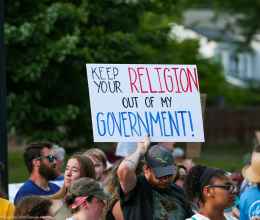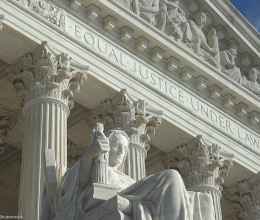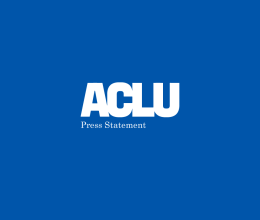
This morning the ACLU of North Dakota and the ND Catholic Conference teamed up to oppose HB 1425, a bill that's detrimental to religious freedom for people of all faiths. Below is ACLU-ND policy director Jen Cook's testimony in opposition to the bill.
Good morning Chairman Armstrong and members of the Senate Judiciary Committee. My name is Jennifer Cook and I am the Policy Director for the American Civil Liberties Union of North Dakota. The ACLU of North Dakota is a nonprofit, nonpartisan organization with more than 6,000 members, activists, and followers. The ACLU of North Dakota is one of the state’s leading organizations dedicated to advancing and defending civil liberties and civil rights.
HB 1425, which purports to regulate North Dakota courts’ use and recognition of foreign law is unnecessary, raises significant constitutional concerns, and also has the potential to create significant unintended consequences in the everyday lives of North Dakotans who marry abroad, file for divorce, adopt children from overseas, or conduct other family matters that involve foreign or international law. For all these reasons, we urge you to give HB 1425 a Do Not Pass recommendation.
HB 1425 is unnecessary and will have a significant impact on religious freedom.
Our federal and state laws afford people of all faiths the right to seek relief from the courts. Courts routinely consider cases that touch on religion in various ways. Our judicial system has long recognized the ability of courts to consider cases that touch on religion in some way if the court is able to evaluate and decide them using neutral principles of law. For example, people of all faiths whether Jewish, Catholic, or Muslim seek relief from courts when their religious freedom is unnecessarily burdened. Because religious freedom rights are at the heart of such cases, they necessarily involve some consideration of, or reference to, religion. If courts undertake the examinations carefully, without becoming improperly entangled with religion, these cases do not present cause for concern. The alternative would be people of all faiths would have no judicial recourse when the government violates their religious freedom rights.[1]
- Applying neutral principles of law when considering cases that involve religious freedom requires the court to look at a particular religion to determine whether there is a valid marriage according to that religion’s doctrinal requirements for marriage, and once the court determines a valid marriage exists, the court will then apply neutral principles of law, like contract or family law, to determine certain aspects of a divorce case (i.e. a prenuptial agreement can only be enforced using contract law if there was a valid marriage in the first place).
- An example of a common religious freedom claim courts routinely adjudicate can be found in the case Nelson v. Miller, 570 F.3d 868, 869 (7th Cir. 2009). In Nelson, the court found that denying a non-meat diet during Lent and on Fridays substantially burdened the religious practice of a Roman Catholic prisoner.
The First Amendment prohibits U.S. courts from imposing religious law as civil law.
HB 1425 will have serious unintended consequences.
Creating confusion and a legal nightmare for many North Dakota families: Courts routinely consider the law of foreign countries for a variety of reasons. It’s especially important in family law matters. Courts look to foreign law to determine the validity of marriages and adoption agreements conducted abroad. But under this bill, a court would be prohibited from recognizing a foreign marriage, an international adoption agreement, or a will executed abroad unless the court first determines that the pertinent country’s legal system provides the exact same rights and liberties as our laws with respect to the issue at hand. That’s a problem because most countries have laws that differ from ours, even when it comes to fundamental liberties and rights, and it could leave many North Dakota families in an untenable position.
- Otherwise legal marriages would be invalidated: A couple from North Dakota who is married abroad would be unable to have their marriage recognized at home unless they choose to be married in a country that provides the exact same procedural and substantive rights relating to marriage as our laws do. Similarly, married couples who move to North Dakota from countries lacking the exact same legal protections (for example, Israel) might not be able to have their marriages recognized.
- Otherwise legal international adoptions would be voided: A North Dakota family who adopts a child from a foreign country must obtain a foreign adoption decree in compliance with the law of that country. But under HB 1425, a court would be prevented from recognizing a foreign adoption decree as valid if the pertinent country does not provide the exact same procedural and substantive rights relating to adoption as our laws do. The measure would also raise significant legal difficulties for adoption agencies, both religious and secular, that facilitate international adoptions.
Weakening the right of religious arbitration: Many people of faith, including followers of Christianity and Judaism, agree to settle family or business disputes and other matters through religious arbitration panels, and courts have long been permitted to enforce these agreements provided that doing so would not violate public policy or cause the court to become too entangled in religion.[2] However, because the religious systems of law used by these arbitration panels do not provide the exact same procedural and substantive rights as our civil laws do, such religious arbitration agreements could be deemed unenforceable by North Dakota courts, impairing the right of people of faith to settle disputes in accordance with the principles of their religion.
Prevents enforcement of judgments from other states: A potential corollary effect of HB 1425 is that it may conflict with the duty of North Dakota courts to give full faith and credit to the judgments of sister states in cases where the judgments have considered foreign laws, international norms, or religious-legal traditions. The ABA noted that, “a state’s refusal to respect the judicial decisions of another state is a serious matter that may in many cases give rise to a constitutional violation.” Under the Full Faith and Credit Clause of the Constitution, a state is obliged to recognize the judgments of a sister state so long as the latter has jurisdiction over the parties and the subject matter. The Supreme Court has made clear that there is no “roving ‘public policy exception’” to the full faith and credit due judgments.” This exacting obligation ensures that states are “integral parts of a single nation,” and not simply an “aggregation of independent, sovereign [entities].”
HB 1425 disrupts the roles of the branches of government and undermines the separation of powers.
As far back as Marbury v. Madison, it has been accepted that while the legislature has the power to write and enact laws, it is “emphatically the province and duty of the judicial department to say what the law is.” Determining what sources of law to look at and how they should be applied are part of figuring out what the law is and thus also quintessential judicial acts.
By forbidding judges from looking at foreign and international law, through HB 1425 the ND legislature will effectively arrogate to themselves this power by enacting sweeping rules on how judges may or may not use foreign and international law in deciding cases.
When bills seeking to restrict judicial reliance on foreign law were introduced in Congress, Justice Scalia issued a stern rebuke to their proponents: “It’s none of your business. … No one is more opposed to the use of foreign law than I am, but I’m darned if I think it’s up to Congress to direct the court how to make its decision.”
HB 1425 may have a discriminatory impact that will raise constitutional questions arising from the First Amendment and Equal Protection Clause.
The history of these bans shows that anti-foreign law measures or bills have been pushed in large part by organizations who openly advocate an agenda that singles out one faith particularly: Islam. In states like Kansas, Tennessee, Louisiana, Florida, Montana and others where bans like these have been pushed, there is significant evidence on the record that the intended purpose for the introduction and passage of such laws is to single out the Muslim faith and deny religious freedom to those people who follow Islam despite the removal of specific language that singles out the Muslim faith from the bills or measures.
The discriminatory purpose of foreign law bans makes them susceptible to constitutional challenge. Denying Muslims the same religious freedoms afforded to people of all other faiths would be a complete betrayal of our country’s core commitment to religious liberty and equality.
These are just a few examples of the serious problems with HB 1425 and we urge you to give a Do Not Pass Recommendation to HB 1425. Thank you for your time and attention this morning. I will stand for questions.
[1] In Sherbert v. Verner, 374 U.S. 398, 410 (1963), the Supreme Court explained that right of free religious exercise extends to individuals of all religions, including, among others, “Catholics, Lutherans, Muslims, Baptists, Jews, Methodists . . . Presbyterians, or the members of any other faith.”
[2] For example, in Zeiler v. Deitsch, 500 F.3d 157, 164 (2d Cir. 2007), the U.S. Court of Appeals for the Second Circuit properly enforced an agreement among two Jewish business partners to arbitrate the division of their assets before a Jewish arbitration panel). And in Encore Productions, Inc. v. Promise Keepers, 53 F. Supp.2d 1101, 1112 (D. Colo. 1999), a federal court properly enforced an agreement to arbitrate a business dispute in accordance with the Rules of Procedure for Christian Conciliation because the plaintiff was “bound by its contract”).




